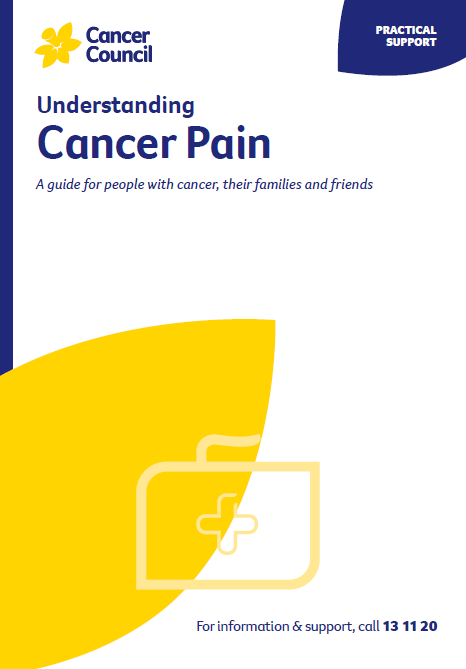- Home
- About Cancer
- Managing side effects
- Pain and cancer
- Managing pain with other methods
Managing pain with other methods
Managing cancer pain often requires more than just medication. We explore how treatments like surgery, radiation therapy, and drug therapies can help relieve pain, especially when traditional pain medicines are not enough or cause side effects.
Learn more about:
- Overview
- Surgery
- Radiation therapy
- Cancer drug therapies
- Making treatment decisions
- Medical procedures
- Other ways to control pain
- Complementary therapies
Overview
Sometimes cancer pain can be difficult to relieve completely with medicines, or you may need to stop taking a pain medicine because of its side effects. If you continue to have pain, let your health care team know. There are other ways to reduce pain that don’t involve medicine. Often a combination of treatments and therapies are more effective than just one.
Cancer treatments, such as surgery, chemotherapy and radiation therapy, can sometimes reduce pain by helping to remove its cause. This will depend on the cancer, the type of pain and where the pain is. Cancer treatment aimed at relieving pain, rather than curing the disease, is called palliation or palliative treatment. For more on this, see Pain and advanced cancer.
Surgery
Whether surgery is an option depends on several factors, including your overall health and fitness.
Some people may have an operation to remove part or all of a tumour from the body. It may be a major, invasive operation or a relatively minor procedure. Surgery can improve quality of life if the pain is caused by a tumour pressing on a nerve or blocking an organ.
Examples include unblocking the bile duct to relieve jaundice (which can occur with pancreatic cancer), or removing a bowel obstruction (which can occur with ovarian or bowel cancer).
For more on this, see our general section on Surgery.
Radiation therapy
Also known as radiotherapy, this treatment uses a controlled dose of radiation, usually in the form of x-ray beams, to kill or damage cancer cells so they cannot grow, multiply or spread.
Radiation therapy will cause tumours to shrink and stop causing discomfort. For example, radiation therapy can relieve pain if cancer has spread to the bones, or headaches if cancer has increased the pressure in the brain. When radiation is used as a palliative treatment for pain management, often only a short course of treatment of a few days to a week or two is required. The treatment team will discuss this with you.
It can take a few days or weeks before your pain improves. You will need to keep taking your pain medicines during this time. In some cases, the pain may get worse before it gets better. Your doctor will be able to prescribe different medicines to manage this. The dose of radiation therapy used to treat pain is low, and the treatment has very few side effects other than tiredness.
For more on this, see our general section on Radiation therapy.
Cancer drug therapies
Drug therapies for cancer may be used to control the cancer’s growth and stop it spreading. The drugs reach cancer cells throughout the body.
This is called systemic treatment, and it includes:
| chemotherapy | use of drugs to kill cancer cells or slow their growth |
| hormone therapy | the use of synthetic hormones to stop the body’s natural hormones from helping some cancers to grow |
| targeted therapy | the use of drugs to attack specific features of cancer cells to stop the cancer growing and spreading |
| immunotherapy | treatment that uses the body’s own immune system to fight cancer |
In some cases, drug therapies can shrink tumours that are causing pain, such as a tumour on the spine that cannot be operated on. By shrinking a cancer that is causing pain and other symptoms, drug therapies can improve quality of life.
In other cases, drug therapies can reduce inflammation and relieve symptoms of advanced cancer, such as bone pain. They can also be used to prevent the cancer coming back.
For more on this, see our general sections on Chemotherapy, Targeted therapy and Immunotherapy.
→ READ MORE: Making treatment decisions about managing cancer-related pain
Podcast: Managing Cancer Pain
Listen to more episodes from our podcast for people affected by cancer
More resources
Professor Paul Glare, Chair of Pain Medicine, Northern Clinical School, Faculty of Medicine and Health, The University of Sydney, NSW (clinical update); Dr Tim Hucker, Pain Specialist, Northern Beaches Hospital, Director, Northern Beaches Pain Management, NSW (clinical update); Dr Keiron Bradley, Palliative Care Consultant, Bethesda Health Care, WA; A/Prof Anne Burke, Co-Director Psychology, Central Adelaide Local Health Network, President, Australian Pain Society, Statewide Chronic Pain Clinical Network, SA, School of Psychology, The University of Adelaide, SA; Tumelo Dube, Accredited Pain Physiotherapist, Michael J Cousins Pain Management and Research Centre, Royal North Shore Hospital, NSW; Prof Paul Glare (see above); Andrew Greig, Consumer; Annette Lindley, Consumer; Prof Melanie Lovell, Palliative Care Specialist HammondCare, Sydney Medical School and The University of Technology Sydney, NSW; Caitriona Nienaber, 13 11 20 Consultant, Cancer Council WA; Melanie Proper, Pain Management Specialist Nurse Practitioner, Royal Brisbane and Women’s Hospital, QLD; Dr Alison White, Palliative Medicine Specialist and Director of Hospice and Palliative Care Services, St John of God Health Care, WA.
View the Cancer Council NSW editorial policy.
View all publications or call 13 11 20 for free printed copies.

